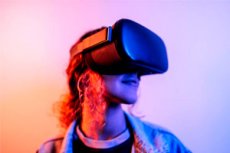
New research examines the use of augmented reality headsets to treat major depressive disorder.
The authors of the study, published in JMIR Mental Health, found that virtual reality treatment showed encouraging results, comparable to current telemedicine therapy for depression.
Extended reality (XR) places the headset user in a synthetic virtual reality (VR) consisting of visual and audio images.
The current study compared the effectiveness of one of the current mainstay interventions for major depressive disorder (MDD), behavior activation therapy, with an augmented reality-enhanced version that The study is called "XR-BA".
Researchers suggest that XR-BA therapy may offer a more enjoyable treatment experience, thereby encouraging patients to continue with it.
How do we know if augmented reality helps treat depression?
The primary measure of the study was participants' scores on the Patient Health Questionnaire (PHQ-9), administered by telephone. Higher PHQ-9 scores indicated more severe MDD.
The study included 26 participants who were randomly assigned to receive either a 3-week course of 4 sessions of behavioral activation therapy or a course of XR-BA therapy sessions in a similar configuration. Participants in the XR-BA group were equipped with Meta Quest 2 virtual reality headsets.
The average age of the participants was 50.3 years, with a range of 17 years. Of these, 73% were women, 23% were men and 4% were non-binary or third gender.
Both groups showed similar and statistically significant declines in their PHQ-9 scores as well as symptom severity between the start and end of the trial.
Among the XR-BA group, PHQ-9 scores decreased even before the first session, suggesting positive expectations for the upcoming trial and a placebo effect.
Virtual reality may help 'lower barriers' to depression care
For people with MDD interested in new technologies, XR-BA therapy can introduce therapeutic content in an engaging environment.
First author Dr. Margot Paul, clinical assistant professor in the Department of Psychiatry and Behavioral Sciences at Stanford University, explained in a press release:
“Clinicians can use XR as a treatment tool to motivate clients to actively participate in their psychotherapy treatment by doing “homework” that is innovative, interesting and accessible. These results indicate that XR can help destigmatize mental health and reduce barriers for people seeking help."
Is there a placebo effect?
Sherife Tekin, Ph.D., assistant professor in the Center for Bioethics and Humanities at SUNY Upstate Medical University, who was not involved in the study, said that while the placebo effect may have some role in the positive mental health effects from XR-BA, this is worth further study.
“We know,” Tekin said, “from both research and patient reports, that active participation in their recovery process strengthens patients' sense of control and power over their environment and life.”
After sometimes challenging training in navigating the virtual world, participants receiving XR-BA treatment were able to engage in a variety of fun activities.
Activities included playing a magical board game, practicing master games, solving puzzles based on clues, dancing to music, and being able to “play” mini golf by yourself or with others.
Tekin suggested that XR-BA could be "an antidote to how a depressed person feels."
"Typically, a person withdraws from previously enjoyed activities, becomes more isolated from their community, and enters a state of almost complete inactivity," she said.
However, in this study, participants "were able to feel energized, entertained, and—most importantly—feel like they were in control by physically pressing buttons to play," Tekin suggested. "This could contribute to the effectiveness of VR."
It is important to “proceed with caution” when recommending VR for treating depression
"Psychiatry has a history of being overly excited about new forms of intervention, placing high hopes on them," Tekin said, "investing all the research money and effort into the intervention, only to be disappointed later."
“We have research and a lot of evidence,” Tekin said, “showing that for mental disorders, a combination of different interventions gives a patient a better chance of coping with their problems than one alone.”
"This is primarily because the human condition is complex, and it is difficult to find one intervention that will suit everyone," she added.
While adding XR-BA to the list of therapies above may seem plausible, it is important, the expert noted, to "proceed with caution and ensure that the patient is given the opportunity to try different treatments to find what works best for them."
Virtual reality may help treat other mental illnesses
It is noted that research has already been conducted on the use of virtual reality for people suffering from post-traumatic stress disorder (PTSD).
"In these studies, scenes and episodes that had a traumatic impact on veterans were simulated in virtual reality in a more controlled environment," Tekin said. "This gives veterans the opportunity to relive the event that caused the trauma, but also feel more confident that they can stop the virtual reality at any time."
Tekin added that she believes in the promise of the new study "as long as we make sure that patients receive these new interventions in addition to their usual treatments."

